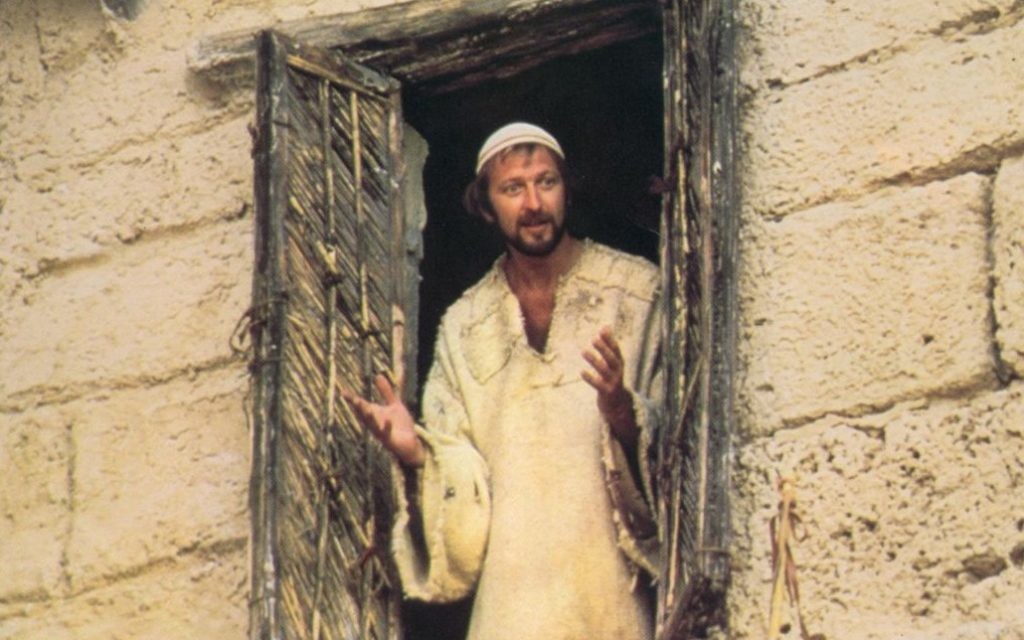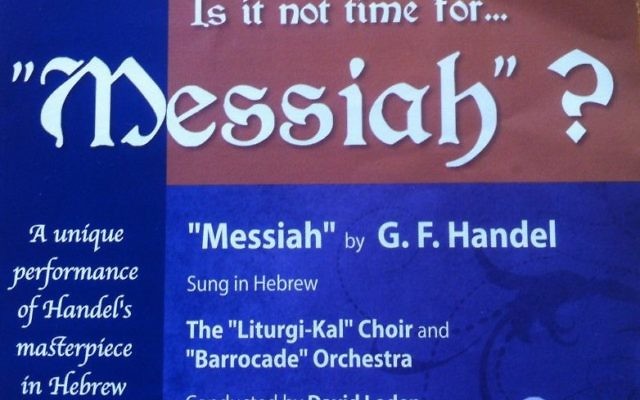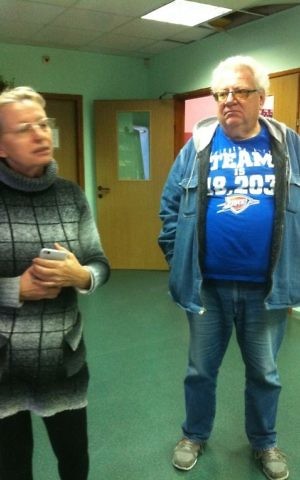‘Redeeming’ the Jewish state from its Jewishness
200 messianic churches are hard at work in Israel seeking to redeem the country from its Jewishness. We go behind the scenes at one of them.

It’s a bright Monday morning in a smart Israeli industrial park. Workers with ID badges and electronic fobs rush busily between the high-tech offices. On an upper floor of B building, alongside a chemicals firm, I’ve discovered Jesus.
Inside Beit Asaph in Netanya, I could be in a non-orthodox shul. A drum kit and microphones are clustered in one corner; there are menorahs on display, an ark. A beautiful wall hanging depicts a lion’s head. A closer look reveals the message, appliquéd in large Hebrew letters down each side, “Jesus the Messiah”. Not your typical shul, then.
In fact, I’m in one of around 200 messianic churches operating throughout Israel, whose mission is to encourage Israelis to accept “Yeshua” (Jesus) into their lives. With me is Rachel, a young American friend, who, when she was a student and new immigrant in Haifa nine years ago, was targeted by several messianic communities.
She’s keen to find out about this growing church community practically on our doorstep. Plus, she can perfectly adopt that hippy vagueness that will allow us to wander in and snoop around.
Get The Jewish News Daily Edition by email and never miss our top stories Free Sign Up
So we breeze towards a young man beating a carpet vigorously outside the heavy metal doors. “Is this the church?” Rachel asks.
“Abba!” He calls, looking behind him. “You wait here,” he tells us, and disappears inside. Instead we follow him, and meet his dad, Lev Guler, the church’s deacon. According to their website, Lev and his wife, Ora, emigrated to Israel from Russia in 1994.
They have five children. Their congregation of 200 “committed believers and seekers” is “predominantly Jewish” and is made up of Russian, English, Hebrew and Amharit speakers. Services take place every Saturday and on “Jewish and Christian festivals”. Bar- and bat-mitzvahs are celebrated here, with traditional Jewish elements combined with teachings from the “Brit Hachadasha” – the New Testament.
 There are estimated to be around 10,000-20,000 Messianic Jews in Israel, which makes them a tiny, but growing, minority. Messianic Jews believe Jesus is the Jewish messiah and that the Bible prophesies that God’s plan is for him to return to Jerusalem, win an apocalyptic showdown against the Antichrist, and rule the world from the Temple Mount.
There are estimated to be around 10,000-20,000 Messianic Jews in Israel, which makes them a tiny, but growing, minority. Messianic Jews believe Jesus is the Jewish messiah and that the Bible prophesies that God’s plan is for him to return to Jerusalem, win an apocalyptic showdown against the Antichrist, and rule the world from the Temple Mount.
According to Ellen Horowitz, content and research director for the lobby group Jewish Israel, Israelis are currently facing a “missionary onslaught” by “evangelical missionaries targeting Jews for conversion”.
Horowitz believes that by actively embracing Christian evangelical “friends”, who provide ideological and financial support for the state as well as a welcome boost to the tourist industry, Israel has ended up in an unholy alliance with fundamentalist evangelical organisations. She says much more needs to be done to educate Israelis about what she calls “the old-new missionary threat”.
The Israel branch of the Jehovah’s Witnesses organisation, headquartered near the Carmel Market in Tel Aviv, has launched a new leaflet and door-to-door campaign.
The Hebrew flyers ask, cryptically, “What’s the Key to Happy Family Life?” above a colour rendering of a man and woman staring sternly into each other’s eyes while a child looks on. “Is it Love? Money? Something Else?” You have to be pretty sharp to spot that the “Food for Thought” overleaf, atop the same illustrated couple, now smiling as they listen to an expert (a doctor or a counsellor, you’d think) is two Bible quotations – one from Leviticus in the Old Testament, the second from Colossians 3 in the New.
Ravit Chason, an Israeli woman living in Netanya, was stunned to receive a visit from the JW. She describes how two people, a man and a woman, rang the bell. “When I opened the door, and they saw I’m religious, they straight away pretended they didn’t speak any Hebrew and that they’re looking for Russian families.” she says. “But then I saw them talking to my neighbour straight afterwards and with her they spoke excellent Hebrew.”.
She says she didn’t hesitate to write a message to her social-media contacts, warning them not to answer the door to the evangelisers.
Back in Beit Asaph, Deacon Lev assumes Rachel and I have turned up to participate in the weekly Good Deeds initiative.
Every Monday, apparently, church members help to distribute parcels of cooked food, groceries and clothing to the needy in the area, including Holocaust survivors. Sure enough, half a dozen people come bustling through, carrying bags of food.
A woman who introduces herself as Karma, from Hadera, comes in laden with Tupperware containers and asks us where the kitchen is. “Uh, through there,” we gesture vaguely, pointing her towards the back. She thanks us profusely and rushes off.
Among these cheerful people, clearly giving freely of their time to help others, it’s hard to imagine there’s a sinister motive. But critics say Beit Asaph, and other messianic churches like it, are deliberately flouting the law with their activities. For example, according to existing Israeli law, nobody can “discuss religion with a minor (under 18 years of age) without their parents’ permission.”
The Beit Asaph site states proudly that “45% of the congregation is under 18 years of age. We provide a comprehensive spiritual education system for our children and youth.”
A glance at the Beit Asaph notice board shows an upcoming “Youth Trip” and a “Pesach Holiday Camp”.
Currently, a proposed new law aiming to tackle “cults” has passed its first reading in the Knesset, but it’s unclear how this would affect the messianic Christian movement. In 1998 there was a move to draft anti-missionary legislation but, faced with strong objections from the American right and also from the Jewish Anti-Defamation League, the bill was scrapped.
I make my way out of Beit Asaph, clutching a copy of the Messianic Times and a flyer for a performance of Handel’s Messiah. Leaving the lift is another volunteer, bringing in plastic bags bulging with shopping.
Back on street level, I’m back in the centre of high-tech Israel and wondering how many of the workers know or care that Jesus is upstairs.

Thank you for helping to make Jewish News the leading source of news and opinion for the UK Jewish community. Today we're asking for your invaluable help to continue putting our community first in everything we do.
For as little as £5 a month you can help sustain the vital work we do in celebrating and standing up for Jewish life in Britain.
Jewish News holds our community together and keeps us connected. Like a synagogue, it’s where people turn to feel part of something bigger. It also proudly shows the rest of Britain the vibrancy and rich culture of modern Jewish life.
You can make a quick and easy one-off or monthly contribution of £5, £10, £20 or any other sum you’re comfortable with.
100% of your donation will help us continue celebrating our community, in all its dynamic diversity...
Engaging
Being a community platform means so much more than producing a newspaper and website. One of our proudest roles is media partnering with our invaluable charities to amplify the outstanding work they do to help us all.
Celebrating
There’s no shortage of oys in the world but Jewish News takes every opportunity to celebrate the joys too, through projects like Night of Heroes, 40 Under 40 and other compelling countdowns that make the community kvell with pride.
Pioneering
In the first collaboration between media outlets from different faiths, Jewish News worked with British Muslim TV and Church Times to produce a list of young activists leading the way on interfaith understanding.
Campaigning
Royal Mail issued a stamp honouring Holocaust hero Sir Nicholas Winton after a Jewish News campaign attracted more than 100,000 backers. Jewish Newsalso produces special editions of the paper highlighting pressing issues including mental health and Holocaust remembrance.
Easy access
In an age when news is readily accessible, Jewish News provides high-quality content free online and offline, removing any financial barriers to connecting people.
Voice of our community to wider society
The Jewish News team regularly appears on TV, radio and on the pages of the national press to comment on stories about the Jewish community. Easy access to the paper on the streets of London also means Jewish News provides an invaluable window into the community for the country at large.
We hope you agree all this is worth preserving.
-
By Laurent Vaughan - Senior Associate (Bishop & Sewell Solicitors)
-
By Laurent Vaughan - Senior Associate (Bishop & Sewell Solicitors)
-
By Laurent Vaughan - Senior Associate (Bishop & Sewell Solicitors)
-
By Laurent Vaughan - Senior Associate (Bishop & Sewell Solicitors)























